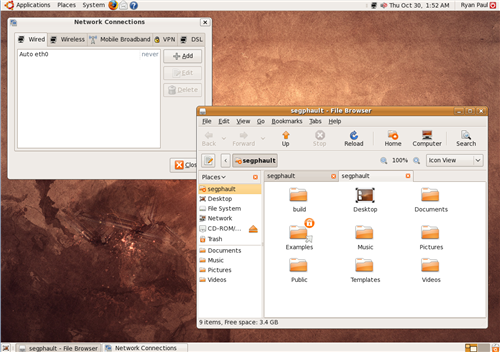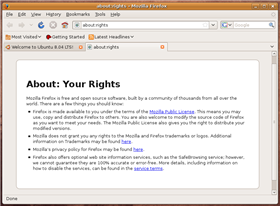 The Ubuntu developers have announced the official release of Ubuntu 8.10, codenamed Intrepid Ibex. This release includes new versions of many popular open source desktop applications and also introduces several important new features.
The Ubuntu developers have announced the official release of Ubuntu 8.10, codenamed Intrepid Ibex. This release includes new versions of many popular open source desktop applications and also introduces several important new features.
Ubuntu 8.04 is built on version 2.6.27 of the Linux kernel which introduces improved support for webcam hardware and the new ath9k wireless driver from Atheros. Ubuntu also comes with version 2.24 of the open source GNOME desktop environment, which includes some nice user interface improvements, such as support for tabbed file browsing and a new screen resolution configuration utility.
Ubuntu 8.10 includes Xorg 7.4, which has improved support for input device hotplugging. This takes Linux one step closer to completely eliminating the need for Xorg configuration files. Network configuration gets a big boost in this release with the addition of Network Manager 0.7, which adds support for managing 3G and PPPoE connections and configuring static IP addresses. The new version of Network Manager also has a more complete end user interface that exposes a variety of other configuration features.
Ubuntu 8.10 also includes the Dynamic Kernel Module Support system, a framework created by Dell that will automatically recompile kernel modules when kernel packages are updated. This will hopefully reduce breakage of VirtualBox and other applications that rely on third-party kernel modules.
This release introduces a few nice privacy features, including a new guest user mode for the fast-user-switching applet and support for directory encryption. There are a few new server features too, such as support for Xen, a new virtual machine generator, and Samba 3.1, which adds support for IPv6 and improved Windows networking integration. Some minor improvements worth mentioning are the new BBC media content plugin for the Totem video player and the availability of Sun's OpenJDK open source Java runtime from the official Ubuntu repository.
One insignificant but interesting change that users will observe in Ubuntu 8.10 is Firefox's new alternative to the annoying license agreement display that used to pop up when the program is launched for the first time. Instead of displaying a license agreement and requiring the user to agree to the terms, the new version displays a bar informing the user that the program is open source software. The user can click a "Know your Rights" button in the bar to launch a new about:rights display.
There were several major open source software releases that occurred late in the Ubuntu development cycle and some of those programs couldn't be included in the 8.10 release. GIMP 2.6, which we reviewed earlier this month, was one of the few late arrivals that managed to get included. Mono 2.0 and Python 2.6 both missed the cutoff, so the base install includes Mono 1.9.1 and Python 2.5.2 by default.
The Empathy instant messaging client, which was one of the most significant features added in GNOME 2.24, was not included in Ubuntu 8.10. After conducting careful analysis, the Ubuntu team chose to continue shipping Pidgin as the default instant messaging client in this release. Empathy will likely be included in the next Ubuntu release, after it has had an opportunity to improve and mature. Another controversial omission in Ubuntu 8.10 is OpenOffice.org 3.0.
This release is another nice incremental improvement, but there are still some weaknesses and gaps in functionality. One of our biggest complaints about Ubuntu 8.04 was poor desktop search integration. This issue still hasn't been addressed, and the Tracker front-end doesn't appear to have improved. I haven't tested it for long enough to determine yet whether PulseAudio is usable in this release, but some anecdotal evidence from testers indicates that it is better than in 8.04 but still somewhat problematic.
The planning process has already begun for Ubuntu 9.04, which is codenamed Jaunty Jackalope. The roadmap will be assembled in December at the Ubuntu Developer Summit that will take place at Google's headquarters in Mountain View. Some of the big goals for 9.04 include plans to improve boot time and system performance. The developers also aim to integrate web technologies more tightly with the desktop.
Ubuntu 8.10 is available for download from the Ubuntu web site, as are several other flavors, including Kubuntu, Xubuntu, UbuntuStudio, and Mythbuntu. Users can also upgrade directly from Ubuntu 8.04. For more information about this version, check out the official release notes.



reader comments